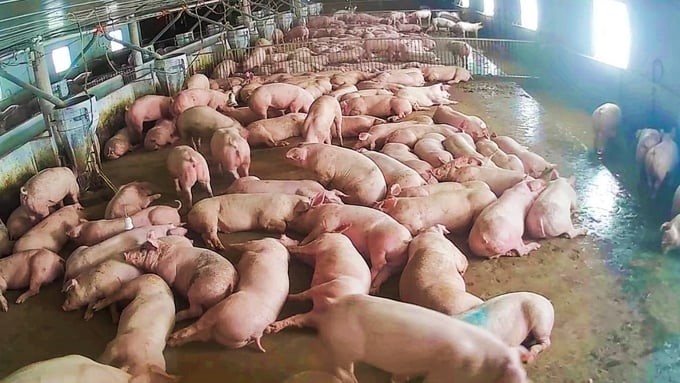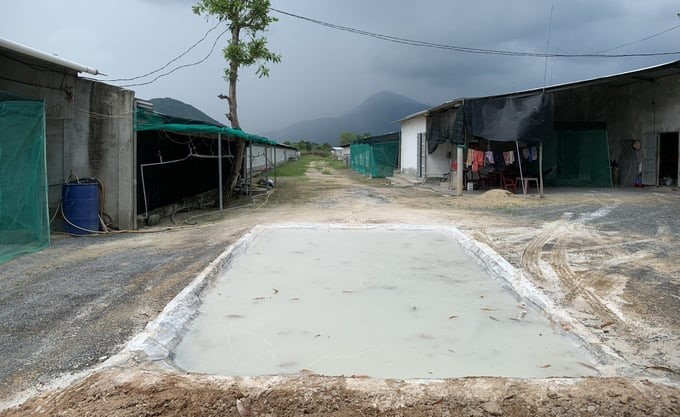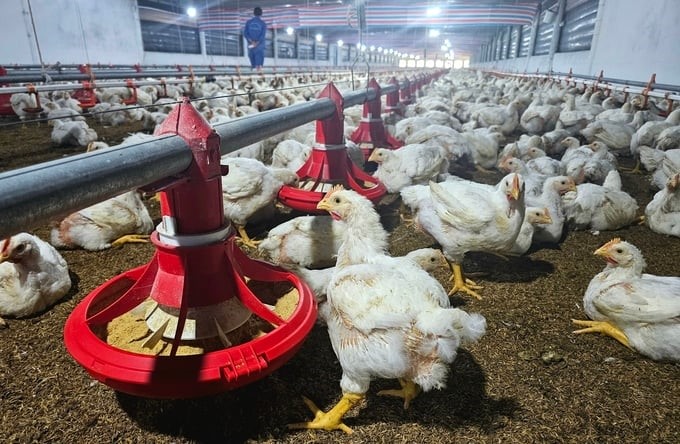June 17, 2025 | 14:42 GMT +7
June 17, 2025 | 14:42 GMT +7
Hotline: 0913.378.918
June 17, 2025 | 14:42 GMT +7
Hotline: 0913.378.918

A chicken farm in Cam Lam district, Khanh Hoa province. Photo: Kim So.
Cam Lam district, located in the south and about 30km from Nha Trang city (Khanh Hoa), has the basic characteristics of a high temperature and the lowest rainfall in the province.This is the basis for killing disease-causing germs and the favorable condition for livestock farming development.
Furthermore, Cam Lam also has many large areas of spacious hilly garden land that is suitable for cattle and poultry farming and ensures safe distances and construction locations according to the Law on Animal Husbandry.
From these advantages, Cam Lam soon rose to become the “capital” of livestock farming in Khanh Hoa province, with the number of cattle and poultry herds accounting for a high proportion in this province. Of which, the pig herd accounted for nearly 50% of the total herd.

Cam Lam district has shifted to farm-scale farming. Photo: Kim So.
According to Mr. Nguyen Ngoc Trung, Head of Cam Lam Animal Husbandry and Veterinary Station, in recent years, livestock farming in the district has shifted from household farming to farm-scale farming associated with disease safety.
Specifically, for pig farming, the whole district has 31 large-scale farms, 54 medium farms, and 13 small farms. As for chicken farming, the district has 25 medium farms and 13 small farms. The total herd of cattle and poultry raised on the farm reaches more than 868,000 heads, accounting for approximately 90% of the total herd in the entire district.
“After the African swine fever epidemic occurred in the area in 2019, small-scale livestock farming seemed to decrease sharply, and farm-scale livestock farming began to develop. In particular, reputable companies came to the locality to invest and link in developing livestock farming in the direction of cold farms with disease safety assurance. Small-scale farming has now decreased by 45–50% compared to before," said Mr. Trung.
It can be said that cold, closed farming models have helped farmers avoid disease risks caused by environmental factors, reduce environmental pollution, and aim for effective and sustainable livestock farming.

Chicken farms all set up lime pits to disinfect entering and exiting vehicles. Photo: Kim So.
Mr. Le Van Hoa’s family, Vinh Trung village, Cam An Nam commune (Cam Lam), has a chicken farm with cold barns. The farm has a total area of more than 11,000 m2, including 2 rows of barns with an area of 1,400 m2/barn stocking 14,000 heads. The entire process from raising to feeding is closed, so the chicken flock grows quickly, no dangerous diseases occur, and especially input and output are all ensured for consumption by businesses.
Mr. Le Van Hoa said that his family raises white-feathered chickens (a super meat chicken breed) under a contract with C.P. Vietnam Livestock Joint Stock Company. Accordingly, the company provides seeds, feed, and instructions on technical farming procedures, while Mr. Hoa invests in the farm and takes care of and cleans the barn.
With each batch of chickens sold for more than 40 tons after 45 days, Mr. Hoa receives VND 5,400–6,000/kg (depending on the time). After deducting expenses, he earns a profit of about VND 100 million/barn.

The model of chicken farming linkage brings efficiency to people. Photo: Kim So.
Similarly, Mr. Pham Van Thu, in Tan Sinh Tay village, Cam Thanh Bac commune (Cam Lam), also raises white-feathered chickens for C.P. Vietnam Livestock Joint Stock Company.
Currently, Mr. Thu's farm has a total area of about 10,000 m2, including 2 rows of barns with an area of 1,200 m2/barn and stocking a total of 24,000 heads. Due to the closed farming model, the farming barn is always maintained at a stable temperature of 28–29oC, along with strict implementation of good veterinary hygiene inside and outside the barn, so no disease in chickens occurs. The loss rate is only about 3%.
Each year, Mr. Thu's family raises 3–4 batches of chickens, and each batch has about 24,000 heads. After deducting expenses, his family earns a profit of VND 180–200 million/batch.
The Head of Cam Lam Animal Husbandry and Veterinary Station said that the district now has 5 businesses linking with people to implement livestock farming, including: C.P. Vietnam Livestock Joint Stock Company, CJ Vina Agri Co., Ltd., Japfa Comfeed Company, Emivest Co., Ltd., and VietSwan Company, with the main farming objects being chickens and pigs.

White-feathered chickens, or super meat chickens, are raised for 45 days before being sold. Photo: Kim So.
According to Mr. Nguyen Ngoc Trung, in livestock farming, seed and feed are the decisive factors for farming efficiency. Many livestock farmers in the area who process for companies will no longer worry about poor-quality breeds and animal feed floating in the market.
Farmers are no longer worried about disease problems because the companies have a team of technical staff and veterinarians who regularly monitor and guide farmers on farming techniques and cleaning barns to ensure disease safety.
Through supervision and inspection by the district veterinary agency, the processing farms have well-implemented biosafety measures, and disease vaccination is strictly implemented. Thanks to that, livestock farming in the district has developed stably, and since the beginning of the year, no dangerous epidemics have occurred.
Translated by Huyen Vu Thu
/2025/06/12/3721-2-202745_83.jpg)
(VAN) TH made an impression at Seoul Food 2025 with its line of natural beverages, paving the way for Vietnamese food products to enter the South Korean market.

(VAN) Soc Trang's success in rice exports stems from a strategy of developing fragrant and specialty rice cultivation areas and standardizing production toward low-emission practices.
/2025/06/11/1311-5-120811_839.jpg)
(VAN) The pig farming industry is facing the challenge of comprehensive restructuring to meet requirements for quality, safety, traceability, and market expansion both domestically and for export.

(VAN) Vietnam considers participating in ALGROALBA in order to expand agricultural production, coordinate the assessment and effective exploitation potential land.
/2025/06/05/5314-1-184727_407.jpg)
(VAN) From seemingly worthless fish scales and skin, enzymes and lactic ferments can transform by-products into peptides, opening a sustainable, effective business direction and elevating Vietnamese seafood.

(VAN) TTC AgriS and IFC signed a strategic partnership to develop a sustainable agricultural value chain, aiming to achieve the Net Zero target by 2035.

(VAN) Seafood by-products are opening a new path, combining green growth and technological innovation to enhance the industry's value.